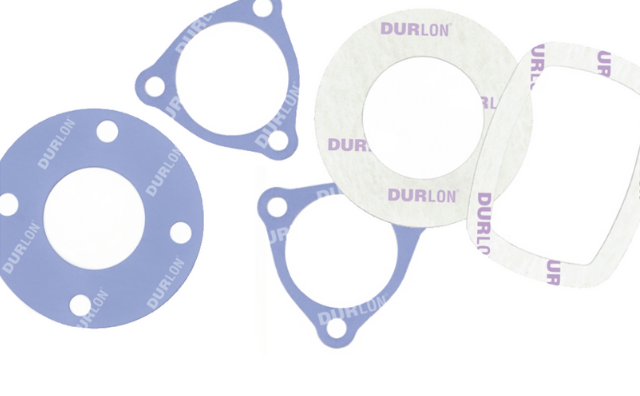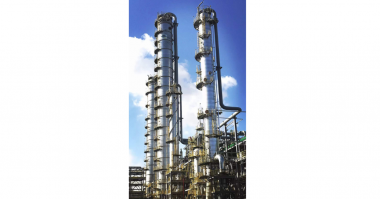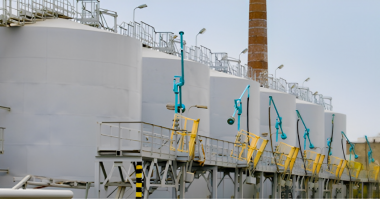Chlorine dioxide is used as a disinfectant in a wide range of industrial applications and industries.
Approximately 95% of all chlorine dioxide produced today is utilized as a pulp bleaching agent by the pulp and paper industry. The chemical processing, food processing, pharmaceutical processing, and water and wastewater management industries also make use of chlorine dioxide, primarily for disinfecting purposes.
While extremely useful and versatile, chlorine dioxide is a dangerous chemical. Breathing it in can cause coughing, shortness of breath, and pulmonary edema, while contact with skin or eyes can cause irritation, burning, and distorted vision.
Highly flammable and reactive, this gas also poses both fire and explosion hazards. For these reasons, it’s important to maintain a reliable, tight fluid containment solution, complete with high-quality, durable components, including chlorine dioxide chemical compatibility gaskets.
CHLORINE DIOXIDE GASKETS
To ensure optimal workplace safety, it’s critical to employ properly specified chlorine dioxide gaskets made from top-quality, reliable materials. While it may be tempting to opt for low-cost materials, only chemically-compatible gaskets will guarantee your team is kept safe and your processes run efficiently.
Our team at Gasket Resources Inc. (GRI) has been designing and manufacturing fluid sealing systems for various uses, including chlorine dioxide applications, for 15 years. Our gasket experts recommend the following gasket materials for applications involving chlorine dioxide:
- Durlon® 9000: An engineered, easily cut filled PTFE, Durlon® 9000 is made by homogeneously blending inorganic fillers of various shapes with pure polytetrafluoroethylene (PTFE) resin. This material was designed specifically for applications involving highly aggressive chemicals, such as chlorine dioxide. Tested and approved for chlorine and a number of other caustic chemicals, Durlon® 9000 is FDA approved.
- Durlon® 9200W: Similar in construction to Durlon® 9000, Durlon® 9200W is a barium sulfate filled PTFE. The filler systems in both Durlon 9000 and Durlon 9200W are evenly dispersed — as opposed to layered PTFE materials, which often have filler voids and buildups. This allows for more consistent physical and mechanical properties. Durlon® 9200W is not vulnerable to the cold flow problems that often occur with generic skived or virgin PTFE, nor is it at risk of developing hardness issues.
- Durlon® 9600: This Durlon® material is 100% pure PTFE. Rather than adding fillers, the PTFE in Durlon® 9600 is expanded — heated and stretched — during processing. This creates a microporous structure in the PTFE, improving mechanical properties without degrading chemical resistance. Like Durlon® 9200W, it is not vulnerable to cold flow or hardness issues.
- Genuine Viton® B: Viton® B is a fluoropolymer elastomer synthetic rubber, a specialized blend of vinylidene fluoride, hexafluoropropylene, and tetrafluoroethylene. This combination of compounds makes for a highly chemical-resistant rubber, excellent for chlorine dioxide gaskets and other chemical-compatibility gaskets. This material is ideal for applications requiring optimal elasticity properties and high mechanical strength.
- Viton® GF-S: GF-S is one of the most advanced Viton® materials, a high-fluorine polymer produced with Chemours Performance Elastomer Advanced Polymer Architecture (APA) polymerization and curing technology. These processes allow for greater control of molecular weight distribution, new cure site monomers, and polymer chain branching.
WORKING WITH OUR GASKET EXPERTS
Our team provides full services for clients looking to standardize their equipment and process. Our dedicated gasket experts review environmental conditions, production, and the chemicals involved to find the right gasket. In addition to providing assistance with choosing the right material and design, our gasket experts are also available for hands-on training. Our training team aims to educate our client’s teams about gasket installations, best practices for use, and maintenance.
We often field questions related to what what type of gasket works best with certain types of chemicals. To address these chemical compatibility queries, our team put together a free interactive tool to help you find the right gasket for your specific application. Can’t find a certain chemical in the tool or have other questions? Contact our technical team today.





Comments